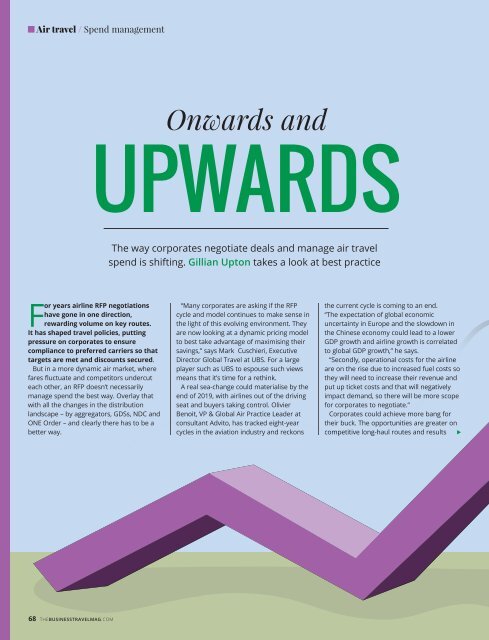You also want an ePaper? Increase the reach of your titles
YUMPU automatically turns print PDFs into web optimized ePapers that Google loves.
Air travel / Spend management<br />
Onwards and<br />
UPWARDS<br />
<strong>The</strong> way corporates negotiate deals and manage air travel<br />
spend is shifting. Gillian Upton takes a look at best practice<br />
For years airline RFP negotiations<br />
have gone in one direction,<br />
rewarding volume on key routes.<br />
It has shaped travel policies, putting<br />
pressure on corporates to ensure<br />
compliance to preferred carriers so that<br />
targets are met and discounts secured.<br />
But in a more dynamic air market, where<br />
fares fluctuate and competitors undercut<br />
each other, an RFP doesn’t necessarily<br />
manage spend the best way. Overlay that<br />
with all the changes in the distribution<br />
landscape – by aggregators, GDSs, NDC and<br />
ONE Order – and clearly there has to be a<br />
better way.<br />
“Many corporates are asking if the RFP<br />
cycle and model continues to make sense in<br />
the light of this evolving environment. <strong>The</strong>y<br />
are now looking at a dynamic pricing model<br />
to best take advantage of maximising their<br />
savings,” says Mark Cuschieri, Executive<br />
Director Global <strong>Travel</strong> at UBS. For a large<br />
player such as UBS to espouse such views<br />
means that it’s time for a rethink.<br />
A real sea-change could materialise by the<br />
end of <strong>2019</strong>, with airlines out of the driving<br />
seat and buyers taking control. Olivier<br />
Benoit, VP & Global Air Practice Leader at<br />
consultant Advito, has tracked eight-year<br />
cycles in the aviation industry and reckons<br />
the current cycle is coming to an end.<br />
“<strong>The</strong> expectation of global economic<br />
uncertainty in Europe and the slowdown in<br />
the Chinese economy could lead to a lower<br />
GDP growth and airline growth is correlated<br />
to global GDP growth,” he says.<br />
“Secondly, operational costs for the airline<br />
are on the rise due to increased fuel costs so<br />
they will need to increase their revenue and<br />
put up ticket costs and that will negatively<br />
impact demand, so there will be more scope<br />
for corporates to negotiate.”<br />
Corporates could achieve more bang for<br />
their buck. <strong>The</strong> opportunities are greater on<br />
competitive long-haul routes and results <br />
68 THEBUSINESSTRAVELMAG.COM

















